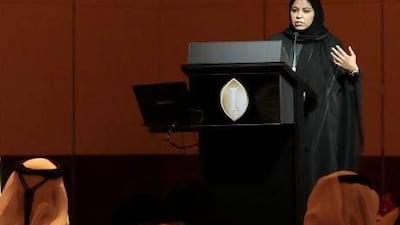DUBAI // A ground-breaking survey providing the first national snapshot of child abuse in the Emirati community was released yesterday.
The survey of 2,939 pupils by the Dubai Foundation for Women and Children (DFWC), found that while verbal abuse was the most common form of maltreatment, they also reported physical and sexual abuse at home and school.
Three per cent said they had been subjected to a specific form of physical, sexual abuse at school “sometimes”, while 0.7 per cent reported it had happened “frequently”.
Two per cent reported a specific form of sexual abuse at home sometimes, and 1 per cent frequently.
Maj Omar Al Ali, of the Ministry of Interior’s Leaders and Innovation Centre, said the numbers of pupils reporting extreme abuses were low, but action was needed.
"We have a low level of violence against children, especially sexual violence and physical abuse," Maj Al Ali said of the results.
"It is low, but it is not zero. So some action should be taken, especially about violence in the schools."
Dr Fadwa Al Mughairbi, a professor of biological psychology at UAE University, agreed.
“The thing that I was really happy about is the sexual violence was very low,” said Dr Al Mughairbi.
“But taking into consideration our culture, our religion and our care for the children, even this percentage, we must reduce it.”
The foundation began planning the study several years ago, when efforts to create a federal child-protection law began.
“I think this study will help decision-makers set policies,” said Afra Al Basti, DFWC director and an FNC member.
The draft child-protection legislation was approved by the federal Cabinet in November and awaits approval by the FNC.
The data was collected during the 2011-2012 school year from Emirati pupils in government schools, most between the ages of 10 and 18.
Social workers travelled to schools in all seven emirates, using an Arabic document adapted from the International Society for the Prevention of Child Abuse and Neglect.
The survey asked children whether they had experienced each type of mistreatment “sometimes” or “frequently.”
For example, 19 per cent said they were slapped at home sometimes, while 5 per cent said it happened often.
The pupils also reported physical abuse at school, whether from peers or adults. About a fifth said things were thrown at them at school sometimes, while 5 per cent said it happened often.
But verbal abuse was the most common, with nearly a quarter saying someone at home shouted at them in a violent or frightening way sometimes, while 8 per cent said it happened often.
“I think we have to pay attention to what we say to our children,” said Aisha Al Midfa, DFWC’s head of programmes and research. “We think that saying things with words might not be abusive.
“We think, as parents, that we are not hitting them, it’s not creating damage. But maybe it is creating psychological damage.”
Ms Al Midfa said parenting classes could play an important role, promoting new disciplinary techniques.
“We really need to teach the parents how to deal with children,” she said. “When we abuse them, that is a sign that we are running out of solutions, out of ways to raise our children.”
The study also calls attention to the need for therapeutic programmes for child abuse victims, said Dr Mona Al Bahar, the foundation’s assistant director for care and rehabilitation, and another FNC member.
“This is very important and nobody focuses that much on the post-traumatic effects,” Dr Al Bahar said.
The children were asked who had abused them, but many chose not to answer. In general, most children who identified a perpetrator said it was someone they knew.
“Some said the father, some said the mother, some said the teacher,” Dr Al Bahar said.
As in any study of this nature, it is possible some children were not truthful, Ms Al Midfa said.
“There is still a risk that they are not revealing things,” she said. “But at least we gave them a chance to write what they feel, if they wanted to express that.”

